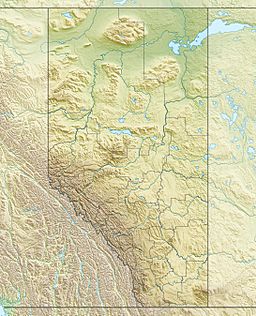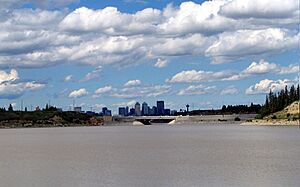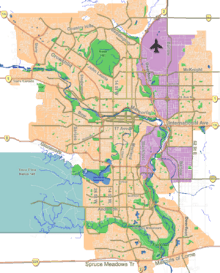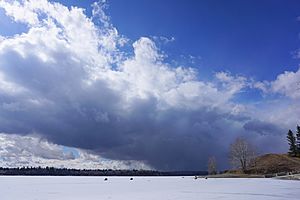Glenmore Reservoir facts for kids
Quick facts for kids Glenmore Reservoir |
|
|---|---|
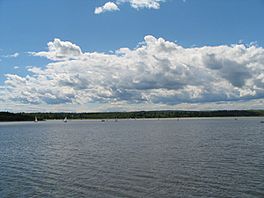 |
|
| Location | Calgary, Alberta |
| Coordinates | 50°59′21″N 114°06′49″W / 50.98917°N 114.11361°W |
| Lake type | reservoir |
| Primary inflows | Elbow River |
| Primary outflows | Elbow River |
| Catchment area | 1,210 km2 (470 sq mi) |
| Basin countries | Canada |
| Max. length | 4.1 km (2.5 mi) |
| Max. width | 0.9 km (0.56 mi) |
| Surface area | 3.84 km2 (1.48 sq mi) |
| Average depth | 6.1 m (20 ft) |
| Max. depth | 21.1 m (69 ft) |
| Surface elevation | 1,080 m (3,540 ft) |
The Glenmore Reservoir is a big reservoir in the southwest part of Calgary, Alberta. It's built on the Elbow River. The Glenmore Dam is a concrete dam that helps control the water in the reservoir.
This reservoir is super important because it's the main source of drinking water for the City of Calgary. The dam was built in 1932. It helps control the river's flow, which means less risk of flooding for areas near the river.
The reservoir covers about 3.84 square kilometers (1.48 square miles). The area that drains water into it is much larger, about 1210 square kilometers (467 square miles). In 2014, the City of Calgary planned to upgrade the Glenmore Dam to make it even better.
Contents
History of the Glenmore Reservoir
The land where the Glenmore Reservoir is now was first settled by a Calgary pioneer named Sam Livingston. He called the area Glenmore, which means "big valley" in a language called Gaelic.
In the early 1900s, Calgary started thinking about needing a new way to get drinking water. By the 1920s, the city's water supply was often muddy and not enough for everyone. Experts suggested building the Glenmore Dam and Reservoir to fix this problem.
The people of Calgary voted in 1929 to borrow money for the project and other water improvements. With approval and money, the city began buying land. This included land from the Tsuutʼina Nation. The first work on the dam started on July 26, 1930. The first concrete was poured a few months later.
The dam was finished and started working on January 19, 1933. There wasn't a big party, but thousands of Calgarians came to see it a week later. When the area flooded in the summer of 1933, part of Sam Livingston's old house was saved. You can still see it today at Heritage Park Historical Village, which is right next to the reservoir.
The dam was designed to provide water for 200,000 people. But by 1949, with 105,000 people in Calgary, the system was already working very hard. So, the city added more capacity in 1957 and again in 1965. Another water treatment plant, the Bearspaw Treatment plant, was built in 1972 to help supply water to the city.
Major Floods: 2005 and 2013
Even though the dam helps prevent floods, there have been times when the water was too much.
The 2005 Flood
In June 2005, a big flood happened. The reservoir got so full that water spilled over the dam and into the river. The river flow downstream became much faster than usual. This caused some roads to close, and about 2,000 people living downstream had to leave their homes. The water treatment plant had trouble cleaning the very muddy water, so the city asked people to use less water. This flood was considered a "200-year flood," meaning it was a very rare and big event.
The 2013 Flood
In June 2013, heavy rain west of Calgary caused another huge flood. Again, the reservoir overflowed. The water flow downstream was even faster than in 2005. About 75,000 people from 26 neighborhoods near the Bow and Elbow rivers had to leave their homes because the rivers flooded. City officials asked people to stay home, especially those who worked downtown. Luckily, the Glenmore water treatment plant was able to clean the water this time. However, the city still asked people to limit outdoor watering to keep water quality high. This flood was called the worst in Alberta's history.
How the Dam Works
The Glenmore Dam is a gravity dam. This means it uses its own heavy weight to hold back the water. It's built to be so massive that it can resist the strong push of the water behind it.
The Glenmore Water Treatment Plant cleans the water from the Elbow River. It was built in different stages over the years. This plant provides clean drinking water to the southern parts of Calgary.
Controlling Floods
The reservoir's water level is carefully managed. This helps reduce the risk of flooding both around the reservoir and downstream from the dam. If the Elbow River's flow gets too high, water might be released from the dam in a controlled way to prevent it from overflowing.
Fun Activities at the Reservoir
The City of Calgary offers fun activities at the reservoir! You can take sailing lessons or rent boats. The reservoir is home to the Glenmore Sailing Club, the Calgary Rowing Club, and the Calgary Canoe Club. These clubs host social events and sports competitions.
From May 1 to October 31, you can go fishing, sailing, rowing, and canoeing on the reservoir. However, swimming in the reservoir is not allowed.
There are also popular pathways and bikeways that go all around the Glenmore Reservoir. These are open all year long, perfect for walking, running, or biking!
Rules for the Reservoir
The Glenmore Reservoir and Dam were built to give Calgarians safe drinking water. Because of this, there are special rules (bylaws) to keep the water clean. Under the Water Utility Bylaw, you must not:
- Go into or stay on the water or ice of the Glenmore Reservoir.
- Put anything into the water or onto the ice of the Glenmore Reservoir, or any stream that flows into it.
- Do anything that could make the water dirty or unsafe.
- Connect any drain that would send water into the Glenmore Reservoir.
Dogs at the Reservoir
Calgary's Responsible Pet Ownership Bylaw also has rules for animals. Pet owners must make sure their animals do not go into or stay on the water or ice of the Glenmore Reservoir at any time.
Images for kids
 | Delilah Pierce |
 | Gordon Parks |
 | Augusta Savage |
 | Charles Ethan Porter |


